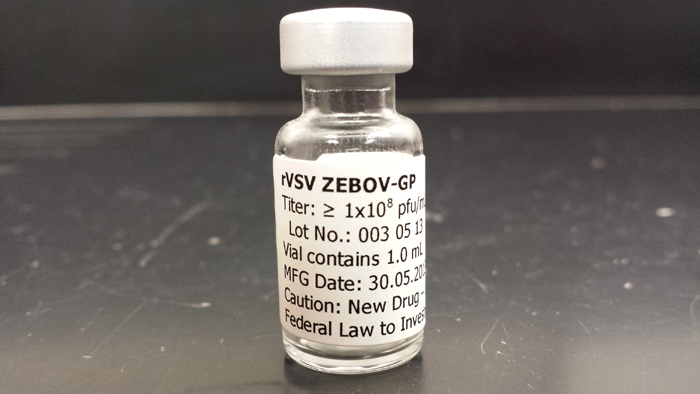Former Army Ebola Researcher Named a Time Magazine 2014 'Person of the Year'

Time magazine named the "Ebola fighters" as their 2014 'Person of Year' Dec. 10, highlighting among others Dr. Thomas Geisbert, a virologist formerly with the U.S. Army Medical Research Institute of Infectious Diseases who conducted some of the first trials of the drug TKM-Ebola.
In an interview for the magazine, Geisbert talked about his experiences during the 1990s and early 2000s at USAMRIID, which is a biosafety level 4 lab located on Fort Detrick in Frederick, Maryland. At the time, as they studied Ebola virus and potential vaccine candidates, others were not as interested. Geisbert described how excited he was that USAMRIID's scientific contributions led to drugs that supported the current outbreak response.
"In this Ebola outbreak, we know at least four to five people got the TKM drug, and all have survived. But we don't want to say the drug was the reason they survived. While we hope they helped in patients, we can't say for sure because the patients got so many other things. There are so many confounding variables, so how can you say any one thing made the difference? But it's a great feeling knowing I was involved in the development of something that hopefully saved somebody. And if it saved one person, it matters," said Geisbert, in his Time magazine interview.
Although Geisbert has since moved on to the University of Texas Medical Branch at Galveston, other researchers at USAMRIID have continued the fight against Ebola. In fact, the efforts to develop diagnostic capabilities, in addition to prevention and treatment countermeasures have increased dramatically for USAMRIID and the other units within the U.S. Army Medical Research and Materiel Command.
For example, the Walter Reed Army Institute of Research located in Silver Spring, Maryland, began testing an experimental Ebola vaccine, called VSV-EBOV, on healthy human volunteers in October. They hope to have early results by the end of the year.
Since April 2014, USAMRIID and the National Institute of Allergy and Infectious Diseases-Integrated Research Facility have provided personnel, training and diagnostic laboratory support to the Liberian Institute for Biomedical Research on a continuous rotational basis, according to Randal J. Schoepp, Ph.D., chief of USAMRIID's Applied Diagnostics branch. He and several others helped to set up an Ebola virus testing laboratory in Liberia and trained local personnel to run diagnostic tests on suspected Ebola hemorrhagic fever clinical samples.
Schoepp said USAMRIID has been working on a collaborative project in West Africa since 2006. Because the team was working on disease identification and diagnostics in the region, he added, "We had people on hand who were already evaluating samples and volunteered to start testing right away when the current Ebola outbreak started."
In addition to providing laboratory testing and training support for the current outbreak, USAMRIID has collaborated with Medical Countermeasure Systems-Critical Reagents Program to provide more than 10,000 Ebola assays to support laboratory capabilities in Liberia and Sierra Leone. The institute also supplied personal protective equipment to Metabiota Inc., a non-government organization involved in the testing.
USAMRIID also developed the primary diagnostic test used by the Defense Department and Centers for Disease Control and Prevention for identification of Ebola-infected patients. Collaborative efforts by USAMRIID, the U.S. Army Medical Materiel Development Activity, and the Joint Program Executive Office ' Chemical and Biological Defense, Medical Countermeasure Systems resulted in the EZ1 PCR Assay being implemented on a national scale under the Food and Drug Administration's Emergency Use Authorization. This test has been used in the diagnosis and management of all Ebola patients in the U.S.
Additionally, as part of Operation United Assistance, USAMRIID has also been providing 2-person mobile teams to train deploying personnel how to properly put on and take off life-saving personal protective equipment. The mobile teams have trained more than 4,000 military personnel. These forces are not expected to be in direct contact with Ebola patients or suspected Ebola patients, according to the Defense Department, however, force protection and public health safety is key.
The USAMRMC has established an Ebola Response Management Team that focuses on logistics support; laboratory operations; force health protection; training the force; and research and development, to ensure the intense mission is well-coordinated world-wide.
In a video message, Time editor Nancy Gibbs acknowledged the "tireless" mission of the Ebola response effort.
"Ebola is a war, and a warning. The global health system is nowhere close to strong enough to keep us safe from infectious disease, and 'us' means everyone, not just those in faraway places where this is one threat among many that claim lives every day," said Gibbs. "The rest of the world can sleep at night because a group of men and women are willing to stand and fight."
 An official website of the United States government
An official website of the United States government
 ) or https:// means you've safely connected to the .mil website. Share sensitive information only on official, secure websites.
) or https:// means you've safely connected to the .mil website. Share sensitive information only on official, secure websites.


